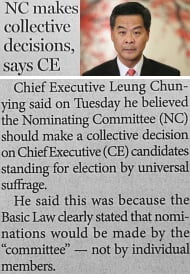 Never let it be said that China Daily doesn’t let you know what’s coming. (Story not online, but also buried away here.) Chief Executive CY Leung instructs us in Basic Law semantics. The Nomination Committee that will in theory select candidates for Hong Kong’s 2017 Chief Executive election will act ‘collectively’. In plain words: a committee is a rubber stamp. Just as the current Election Committee simply ‘elects’ the Chief Executive Beijing has previously decided will win, so the core bloc on the nominating body (essentially the same thing) will merely pretend to select the central government’s pre-determined participants. The rest of us will then be able to vote for one of these candidates.
Never let it be said that China Daily doesn’t let you know what’s coming. (Story not online, but also buried away here.) Chief Executive CY Leung instructs us in Basic Law semantics. The Nomination Committee that will in theory select candidates for Hong Kong’s 2017 Chief Executive election will act ‘collectively’. In plain words: a committee is a rubber stamp. Just as the current Election Committee simply ‘elects’ the Chief Executive Beijing has previously decided will win, so the core bloc on the nominating body (essentially the same thing) will merely pretend to select the central government’s pre-determined participants. The rest of us will then be able to vote for one of these candidates.
We can be fairly certain that most public figures who identify as part of the pro-democracy camp will not get onto an initial shortlist, let alone Beijing’s finalized ballot. While this is obviously a travesty of democratic principles, from a governance and public-policy point of view it will be no great loss.
Many, many years ago – probably the early 90s – I recall a government attempt to get the Legislative Council to raise the Cross-Harbour Tunnel toll. Then as now, low pricing distorted traffic flows and created congestion and pollution, and thus led to economic costs and damage to people’s health. The Democratic Party lawmakers, under then-leader Martin Lee, joined vested interests in voting the measure down, citing some sort of unfair-to-drivers garbage. Beijing’s essential claim that a pro-dem Chief Executive could be a CIA-backed threat to one-party rule and national security looks like (and is) absurd Communist paranoia. But screening pan-dems out on grounds of their incompetence might strike much of the public as prudent.
Not that prominent members of the pro-Beijing camp look like dazzling leadership material. Various names get tossed around, such as natural-born patriot Tsang Yok-sing, slick-and-smug financier Antony Leung, this or that senior civil servant, or even a new-look, warm-and-cuddly CY Leung. But imagine having to finalize a ballot of, say, three candidates.
Any attempt to fix the final stage of a so-far totally-rigged process will invite a voter boycott, and the ‘winner’ will fail before even taking office, leaving even more  of a crisis than we have now. So at least two of the candidates have to be serious and electable and fit to claim a popular mandate. They will need to go beyond the traditional quasi-election charade of throwaway policy platforms and endorsements from fawning tycoons and Emperor Group pop stars. They’ll need halfway credible teams to back them and look capable of subsequently occupying government posts. If it was happening on a planet being visited by the Starship Enterprise they’d say: “It’s an election, Jim, but not as we know it.”
of a crisis than we have now. So at least two of the candidates have to be serious and electable and fit to claim a popular mandate. They will need to go beyond the traditional quasi-election charade of throwaway policy platforms and endorsements from fawning tycoons and Emperor Group pop stars. They’ll need halfway credible teams to back them and look capable of subsequently occupying government posts. If it was happening on a planet being visited by the Starship Enterprise they’d say: “It’s an election, Jim, but not as we know it.”
Beijing presumably believes it can identify a few candidates that it can both live with and present to the electorate for approval, and indeed to complete the selection, one-man one-vote. Out of a population of 7 million, suitable people obviously exist, right? Even so, good luck with that.
A couple of links for prospective CEs: obviously, overseas domestic workers come way down the list, but don’t miss Time Out HK’s new angle on the story. Also, when you see sense and ban the selfie stick, consider exempting these guys.
